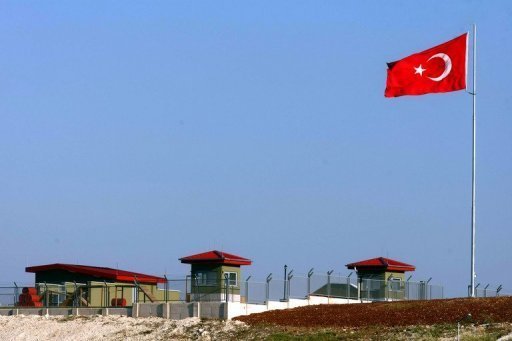
Turkey begins rocket launchers and anti-aircraft guns deployment along its border with Syria after last week’s downing of a fighter jet.
Columns of military vehicles have been seen moving from military bases to the border, close to where the jet crashed.
The F-4 Phantom went down in the sea after entering Syrian airspace and being hit by a missile. The pilots are missing.
Meanwhile, explosions have been reported outside a court complex in central Damascus.
Syrian state TV said there had been a “terrorist explosion” in the car park of the palace of justice and witnesses spoke of a thick plume of smoke in the area.
There was no word of casualties but opposition activists said ambulances were heard heading to the scene.
There are also reports of clashes in the Damascus suburb of Douma, where activists say four people have been killed.

Turkey’s decision to reinforce its border with Syria comes two days after PM Recep Tayyip Erdogan announced a change in terms of its military engagement.
He told parliament that Syria was a “clear and present threat” and any game that is dangerous and “military element” that approached the Turkish border from Syria would be treated as a threat and a military target.
Extra troops have been sent to the area and Turkish TV has shown pictures of a small convoy of trucks carrying anti-aircraft guns into a military base near the border town of Yayladagi.
According to local reports, other military vehicles have travelled to the border town of Reyhanli in Hatay province.
More than 33,000 refugees have fled Syria and have crossed the border into the province.
Turkish President Abdullah Gul is due to discuss the heightened tensions with Syria at a National Security Council meeting on Thursday.
Russia and other major powers are considering a proposal from UN envoy Kofi Annan for a national unity government to lead political change in Syria.
Moscow has agreed to back the plan which, according to Western diplomats, proposes a cabinet including members of the opposition and government, but no-one who would undermine its credibility.
The idea will be discussed on Saturday by the UN Action Group on Syria.
Although Western diplomats say President Bashar al-Assad would not be part of any unity government, his future role in Syria is not spelled out in Kofi Annan’s proposal.
Russian Foreign Minister Sergei Lavrov said on Thursday that President Bashar al-Assad’s future had to be decided through a “Syrian dialogue by the Syrian people themselves”, adding that Saturday’s Geneva conference could not dictate the terms of a unity government.
President Bashar al-Assad has described Syria as being in a “real state of war” and the UN’s deputy envoy to Syria said on Wednesday that the violence “had reached or even surpassed” the levels seen in April when Kofi Annan’s ceasefire plan was agreed.
The UN says at least 10,000 people have been killed since pro-democracy protests began in March 2011. In June, the Syrian government reported that 6,947 Syrians had died, including at least 3,211 civilians and 2,566 security forces personnel.